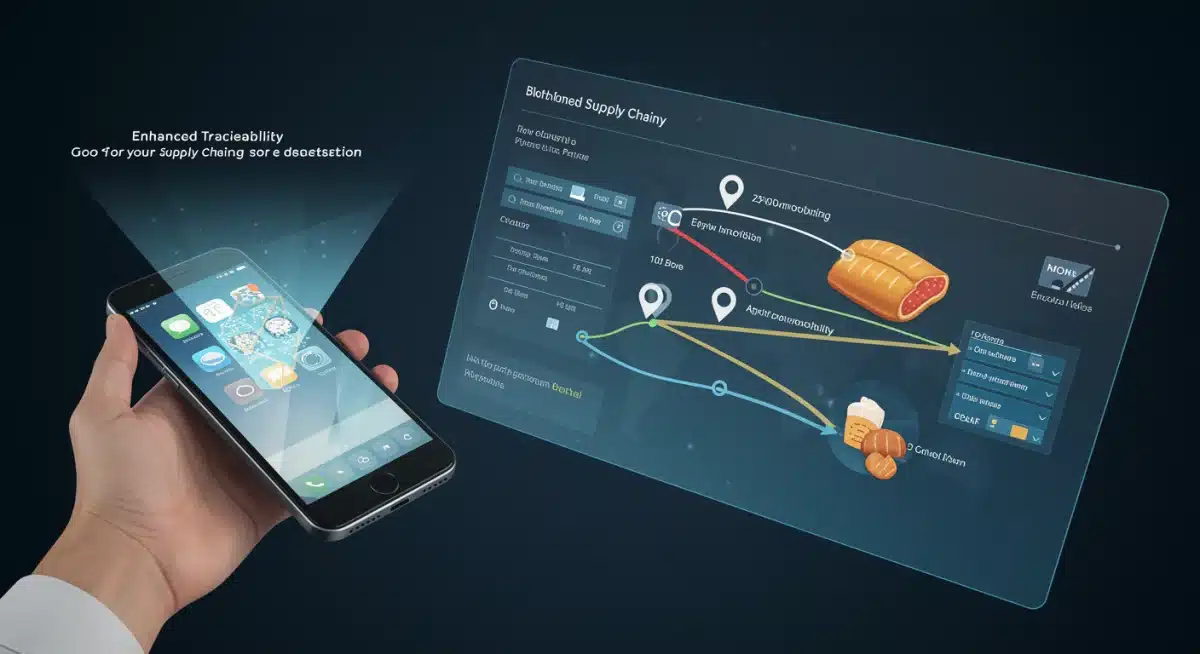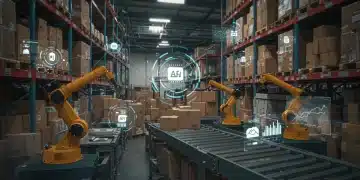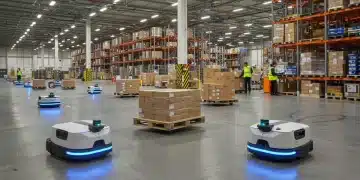Blockchain Beyond Crypto: 6 Supply Chain Innovations Revolutionizing Logistics in 2025

Six pivotal blockchain innovations are slated to revolutionize supply chain logistics by 2025, transcending cryptocurrency applications to deliver unprecedented transparency, efficiency, and security across global operations, fundamentally reshaping how goods move.
Blockchain Beyond Crypto: 6 Supply Chain Innovations Revolutionizing Logistics in 2025 is rapidly emerging as a critical discourse, moving past its origins in digital currencies to redefine how global logistics operate. This shift promises to enhance transparency, bolster security, and streamline complex operations, marking a significant evolution in how goods are tracked and managed worldwide.
The Dawn of Unprecedented Transparency in Supply Chains
The traditional supply chain often grapples with opacity, making it challenging to verify product origins, track movements, and ensure ethical sourcing. Blockchain technology, with its immutable and distributed ledger, is poised to dismantle these barriers, offering a single, verifiable source of truth for all participants.
By 2025, we anticipate widespread adoption of blockchain for end-to-end visibility, allowing every stakeholder, from raw material suppliers to end consumers, to access real-time information about a product’s journey. This level of transparency will not only build trust but also empower consumers with knowledge about the products they purchase.
Real-Time Tracking and Verification
One of the most immediate benefits of integrating blockchain into supply chains is the ability to track goods with unparalleled precision. Each movement, transfer of ownership, and quality check can be recorded as a transaction on the blockchain, creating an unalterable audit trail.
- Immutable Records: Every transaction is permanently recorded, preventing tampering or fraud.
- Enhanced Accountability: Clear ownership and responsibility at each stage of the supply chain.
- Reduced Delays: Real-time data minimizes disputes and accelerates decision-making.
This innovation moves beyond simple GPS tracking, providing cryptographic proof of events, which is crucial for high-value goods, pharmaceuticals, and perishable items where authenticity and condition are paramount. The result is a supply chain that is not only visible but also verifiable at every step.
Smart Contracts: Automating Logistics Agreements
Manual contract execution and dispute resolution introduce significant friction and delays in logistics. Smart contracts, self-executing agreements stored on the blockchain, are set to automate these processes, dramatically improving efficiency and reducing administrative overhead.
By 2025, smart contracts will be integral to various logistical operations, from freight payments to customs clearance. These digital agreements will automatically trigger actions when predefined conditions are met, eliminating the need for intermediaries and reducing the potential for human error.
Streamlining Payments and Deliveries
The impact of smart contracts on payment systems within the supply chain is profound. As soon as goods are delivered and verified at a checkpoint, a smart contract can release payment automatically. This speeds up financial flows and benefits all parties, particularly smaller suppliers who often face extended payment terms.
Furthermore, smart contracts can manage dynamic pricing based on real-time conditions, such as fuel costs or delivery times, ensuring fair and transparent pricing for services. This innovation fosters greater trust and efficiency within the entire logistics ecosystem, making the blockchain supply chain logistics more agile.
Enhanced Traceability and Product Authenticity
Counterfeit goods and product recalls are major challenges that cost industries billions annually and erode consumer trust. Blockchain’s inherent ability to create an unchangeable record of a product’s journey provides a robust solution for authenticity verification and precise traceability.
By leveraging blockchain, companies can assign a unique digital identity to each product, which is then updated at every stage of its lifecycle. This allows for instant verification of authenticity and, in the event of a recall, enables pinpointing affected batches quickly and accurately, significantly reducing risk and waste.
Combating Counterfeiting and Ensuring Quality
The global fight against counterfeit products will receive a significant boost from blockchain technology. Consumers will be able to scan a QR code on a product and instantly access its complete history, verifying its origin and authenticity. This empowers consumers and protects brands from illicit activities.
- Anti-Counterfeiting: Unique digital identities prevent fake products from entering the market.
- Quality Assurance: Records of quality checks and certifications are verifiable throughout the chain.
- Recall Efficiency: Rapid identification and isolation of affected products in case of issues.
This enhanced traceability is not just about security; it also contributes to brand reputation and consumer safety, especially in sectors like pharmaceuticals, luxury goods, and food and beverage, where product integrity is non-negotiable. The integration of blockchain supply chain logistics will be a game-changer.
Optimizing Inventory Management with Distributed Ledgers
Inefficient inventory management leads to significant costs, including waste, storage expenses, and lost sales due to stockouts. Blockchain technology offers a decentralized and real-time solution to optimize inventory levels across complex supply networks.
By creating a shared, immutable record of inventory, all parties in the supply chain can have an accurate and up-to-date view of stock levels. This eliminates discrepancies that often arise from disparate systems and manual data entry, leading to more efficient planning and resource allocation.

Reducing Waste and Improving Forecasting
With real-time, accurate inventory data on a blockchain, businesses can significantly reduce overstocking and understocking. This leads to less waste, lower carrying costs, and improved cash flow. Predictive analytics, when fed with reliable blockchain data, can also become far more accurate, enabling better demand forecasting.
Moreover, the transparency provided by blockchain helps identify bottlenecks or inefficiencies in the inventory flow, allowing for proactive adjustments rather than reactive measures. This proactive approach is essential for maintaining agility in a fast-paced global market, making blockchain supply chain logistics a strategic advantage.
Decentralized Autonomous Organizations (DAOs) in Logistics
The concept of Decentralized Autonomous Organizations (DAOs) is gaining traction, promising to transform how logistics networks are governed and operated. DAOs utilize blockchain to create rules-based, transparent, and self-executing organizational structures, removing the need for centralized authority.
In logistics, DAOs could manage freight alliances, shared warehousing, or even entire shipping consortiums, with decisions made by token holders through voting mechanisms. This offers a more democratic, efficient, and tamper-proof way to manage complex collaborations within the supply chain.
Fostering Collaboration and Efficiency
DAOs can facilitate unprecedented levels of collaboration among diverse logistics partners. By encoding operational rules and incentives directly into smart contracts, DAOs ensure that all participants adhere to agreed-upon protocols without the need for extensive oversight or trust in a central entity. This reduces administrative costs and potential for disputes.
For example, a DAO could manage a network of independent truckers, allocating jobs based on availability, route efficiency, and driver reputation, with payments automatically processed upon verified delivery. This innovative approach to shared resources will unlock new efficiencies in blockchain supply chain logistics.
Secure Data Sharing and Interoperability
One of the persistent challenges in global logistics is the secure and efficient sharing of data across disparate systems and organizations. Blockchain, with its cryptographic security and distributed nature, provides an ideal framework for enabling seamless and secure data exchange without compromising privacy.
By 2025, we anticipate specialized blockchain solutions designed to facilitate interoperability between various legacy systems and new technologies within the supply chain. This will create a unified data environment where information flows freely yet securely, breaking down silos and enhancing overall operational awareness.

Protecting Sensitive Information While Enabling Collaboration
Blockchain allows for selective data sharing, where only authorized parties can access specific information, maintaining the confidentiality of sensitive business data while still contributing to the overall transparency of the supply chain. This is crucial for competitive industries where data is a valuable asset.
- Cryptographic Security: Data encrypted and secured on the blockchain.
- Access Control: Granular permissions for who can view specific information.
- Interoperability: Bridges disparate systems for a unified data view.
This balance between privacy and transparency is a cornerstone of next-generation logistics. The ability to securely share critical data, such as customs documentation, quality certifications, and compliance records, will significantly accelerate processes and reduce friction in cross-border trade, making the blockchain supply chain logistics more robust.
| Key Innovation | Impact on Logistics |
|---|---|
| Unprecedented Transparency | End-to-end visibility, immutable records, enhanced accountability. |
| Smart Contracts | Automated agreements, faster payments, reduced manual errors. |
| Enhanced Traceability | Authenticity verification, anti-counterfeiting, efficient recalls. |
| Secure Data Sharing | Interoperability, cryptographic security, controlled access. |
Frequently Asked Questions About Blockchain in Logistics
Blockchain creates an immutable, distributed ledger where every transaction and movement of goods is recorded. This provides all authorized participants with real-time, verifiable information about a product’s origin, journey, and status, eliminating data silos and fostering trust.
Smart contracts automate the execution of agreements based on predefined conditions. In logistics, they can automatically release payments upon verified delivery, trigger customs clearance, or adjust pricing, significantly reducing manual processes, delays, and administrative costs.
Absolutely. By assigning unique digital identities to products and recording their journey on the blockchain, consumers and businesses can verify authenticity instantly. This makes it extremely difficult for counterfeit goods to infiltrate the supply chain, protecting brands and ensuring consumer safety.
Blockchain provides a real-time, shared view of inventory levels across the entire supply chain. This eliminates discrepancies, reduces overstocking and stockouts, minimizes waste, and improves forecasting accuracy, leading to more efficient resource allocation and cost savings.
Yes, blockchain employs advanced cryptographic security measures to protect data. It allows for controlled, permission-based access, meaning sensitive information can be shared only with authorized parties while maintaining overall transparency and integrity of the ledger.
What this means
The trajectory of blockchain supply chain logistics is clearly moving towards widespread integration, promising a future where global trade is more transparent, efficient, and secure than ever before. Stakeholders should monitor pilot programs and industry consortia, as these initiatives will shape the standards and adoption pathways for these transformative technologies. The coming years will demonstrate how these innovations translate into tangible benefits for businesses and consumers alike, setting new benchmarks for operational excellence in logistics.





